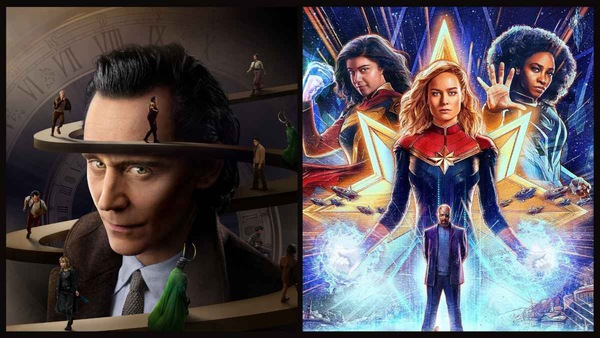‘Loki’ succeeds where ‘The Marvels’ fails: A tale of ironies at Marvel Studios
In a week of mixed fortunes for Marvel Studios, The Marvels released in theatres last week to an unfavourable reception while Loki concluded season two on a stellar note

Last Updated: 06.00 PM, Dec 04, 2023
The foundation of Marvel Studios dates back to the 2008 hit Iron Man. Apart from being the film that launched the most profitable film franchise of all time, Iron Man helped establish a new benchmark for the superhero genre – one that separated itself from films like Christopher Nolan’s grounded take on the Batman mythos (The Dark Knight trilogy). Unlike DC’s caped crusader of Gotham, who is arguably the most popular superhero of all time, Iron Man was not, till then, seen as the most popular Marvel character – Spider-Man, X-Men, and Fantastic Four were Marvel’s flagship heroes. With Robert Downey Jr’s take on the character under Jon Favreau’s vision, Marvel Studios offered moviegoers a fresh idea of a superhero, and the rest as they say is history. As it turns out, the studio would be acquired by Disney soon after and it went from stride to stride and attained unparalleled success. Joss Whedon’s The Avengers (2012) and James Gunn’s Guardians of the Galaxy (2014) also helped the studio crystalise its position by introducing new characters that extended a template for a vast majority of the 33 films that followed under its banner. However, the introduction of new superheroes in the post-pandemic era has become its Achilles Heel.
When Bob Chapek took over the reins at Disney from Bob Iger in 2020, he ushered in a new era focused on their streaming platform, Disney+, hoping to capitalise on the boom in streaming content. However, Disney’s decision to rival Netflix may not have reaped the desired outcome, as several Marvel TV shows on the platform cost astronomically high to produce and the reported viewership figures failed to eclipse Netflix. The critically-panned Marvel TV series Secret Invasion cost over $200 million, while the other shows such as WandaVision, Falcon and the Winter Soldier, and She-Hulk cost approximately $150 million each. This eventually resulted in Chapek being sacked from his position, with Iger reinstated as Disney CEO in 2022. There has also been speculation that Iger was not too keen on relinquishing control and that it may have played a part in Chapek’s unceremonious dismissal.
Despite Marvel Studios struggling with recent theatrical releases, such as Ant-Man and the Wasp: Quantumania and the recently-released The Marvels, a few Marvel TV shows have managed to earn plaudits for their compelling stories, such as Loki and Moon Knight. While Moon Knight caters to a more niche audience, with scattered references that connect its story to the larger Marvel Cinematic Universe (MCU), Loki is pivotal to MCU phases 5 and 6. However, Loki showrunner Michael Waldron has crafted the show with a distinct tone and aesthetic, vastly different and maybe even improved upon the formulaic Marvel films.
Bob Iger recently attributed the Studio’s recent struggles to the abundance of Marvel TV shows that “diluted” the “focus and attention” of Marvel fans. Ironically, Loki season two garnered strong reviews and a record-breaking 11.2 million viewers tuning in for the season finale. Whereas The Marvels struggled with its theatrical release with the MCU’s lowest-ever opening in North America with just $47 million over the weekend. It could be argued that Bob Iger’s sentiments, that the Marvel TV shows should shoulder the blame for Marvel’s current slump, is off the mark. While a barrage of subpar Marvel TV shows certainly did not do the studio any favours, shows such as Loki and even What if…? certainly help diversify Marvel’s catalogue with unique and compelling stories. Loki's success reiterates the fact that the general audience has moved on from the formulaic Marvel films, while compelling stories like Loki continue to amass interest.
The Marvels, directed by Nia DaCosta, reportedly has a production budget of $200 million. The film starring Brie Larson, Teyonah Parris, and Iman Vellani is definitely an improvement in terms of visuals when compared to the other Marvel blockbusters. However, the studio’s reluctance to discard cringe-comedy and cliched tropes has become a liability. It is also essential to note that unlike Tom Hiddleston’s Loki, none of the characters in The Marvels are established characters in the MCU – not even Brie Larson’s Captain Marvel. The Marvels did feature a post-credit scene that will definitely pique the interest of Marvel fans. It is also an indicator that Marvel could be abandoning Kang’s storyline entirely, in the wake of controversies surrounding actor Jonathan Majors, who plays Kang. The post-credits scene also suggests that Kevin Feige and Marvel Studios are finally bringing out the big guns to fill the void left by Iron Man and the first Captain America, but also to spark new life into a struggling franchise. It is almost a cruel twist of irony that the studio that once prided itself in propelling lesser-known superheroes to global stardom, would have to lean on iconic characters such as the X-Men and Fantastic Four.
Bob Iger has confirmed that Disney is exploring options to secure a partnership with Netflix for the distribution of some of its content. Of course, the marquee IPs such as Star Wars, Pixar, and Marvel are off-limits, but a potential deal could see certain titles available on Netflix for a fixed period. It is not a coincidence that the news comes after Marvel’s rival DC announced that its films such as Man of Steel and Wonder Woman will be available to stream on Netflix in December. Disney is also merging Hulu with Disney+ after purchasing the remaining 33% stake in Hulu for an eye-watering $8.6 billion. This can be construed as Disney gambling on more diverse content from Hulu in the hopes of marketing Disney+ more to a wider demographic, considering Disney+ offers barely any R-rated or mature content on their platform.

